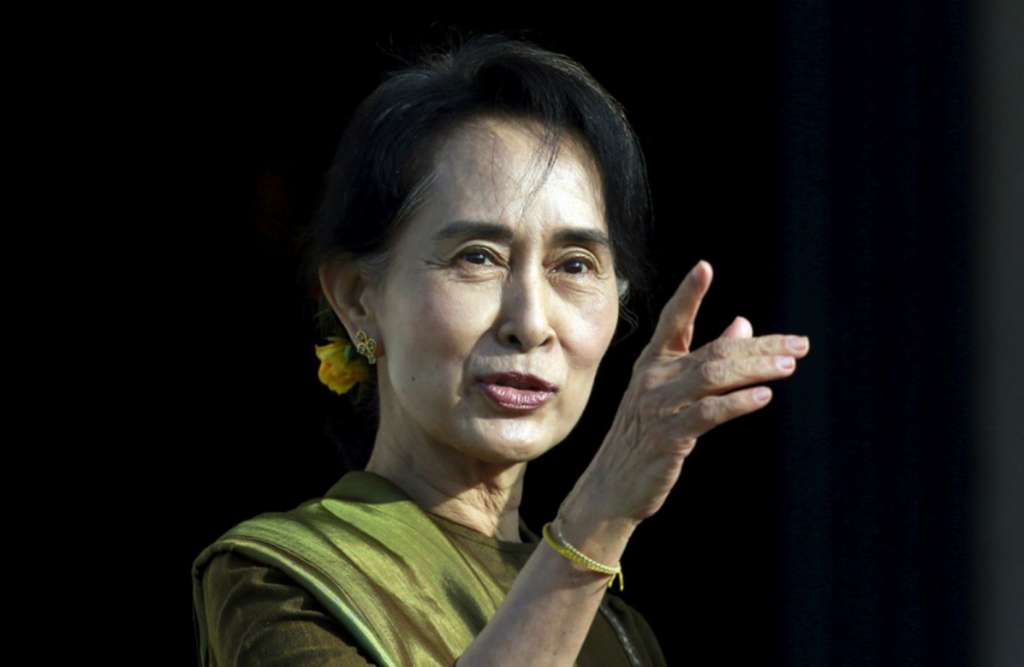Myanmar’s Aung San Suu Kyi, 71, confronts the toughest test of her leadership to date at the upcoming ethnic peace conference on Wednesday to be held in the capital Naypyitaw.
Suu Kyi, a Nobel Peace Prize laureate and leader of the National League for Democracy (NLD), aims to use the conference to end decades of fighting between the rebels and the military across impoverished frontier areas, partly boosted by illegal trades such as drugs, timber and jade.
The rebel groups have been fighting since Burma’s independence in 1948 as rebels pressed for greater autonomy from the central government and group rights.
The peace conference will last five days with hundreds of ethnic minority rebel leaders gathered around the negotiating table, along with military officials and U.N. Secretary General Ban Ki-Moon.
Suu Kyi has made the peace process of ending nearly 70 years of fighting a priority for her administration after winning Myanmar’s general election last November.
“If you ask me what my most important aim is for my country, that is to achieve peace and unity among the different peoples of our union,” she said during a recent visit to China. “Without peace, there can be no sustained development.”
One hundred ethnic groups reside in Myanmar and there has been long-running tension between many ethnic minority groups and the Bamar majority group, which includes Suu Kyi, as many minorities have long faced discrimination.
The talks are expected to cover issues such as culture, political representation, Myanmar’s mineral riches and security. Delegates plan to meet every six months to deal with recent events related to those issues.
Experts say the fact that Suu Kyi managed to convince the majority of rebel leaders to enter peace talks just five-months after sweeping to power is a sign of progress and the first important step to restoring peace.
The military will be a key factor in the success of the conference as they control certain parts of the government. It is also believed that military leaders made billions from the natural resources of the borderlands of Myanmar.
“Anyone who is suggesting there could be any sort of agreement in the coming days or weeks is dreaming,” said Anthony Davis, a security analyst and writer for IHS-Jane’s. He predicted negotiations will take “many years”.
Suu Kyi hopes to extend the ceasefire signed last year between a few rebel groups and the former military government.
Armed rebel groups from the border of China who refused to sign a ceasefire last October will also participate in the peace talks, partly due to China supporting the conference.
China is striving for influence as Myanmar’s economy opens up, with President Xi Jinping vowing that China will play a “constructive role” in the conference when Suu Kyi visited the country earlier this month.
The meeting has been dubbed the “21st Century Panglong” – a reference to the 1947 agreement that granted major minority groups a degree of autonomy. However the agreement collapsed after General Aung San, Suu Kyi’s father and the man who signed the deal, was assassinated months later.
“The ambition of 1947 Panglong Conference was to get independence. Today’s ambition is domestic peace and unity of the whole country,” veteran journalist Phoe Thauk Kyar, who was 14 at the time of the Panglong Conference.
The UNFC, a coalition of eleven rebel groups that campaign for the rights of ethnic minorities (including some that did not sign a ceasefire), will be attending the talks. A spokesperson for the coalition said the peace conference would be “like a grand opening ceremony”.
Leaders of the rebel groups attending will be allowed to give brief speeches but there will be no follow-up debates.
One rebel leader, who asked to remain anonymous, said: “We will not get a solution from this conference because there will be no discussion or debate,” he said. He however added that it will be a unique opportunity to “talk openly” with the government.
The Rohingya people, Myanmar’s Muslim minority group who face state-sponsored discrimination, will not be included in Suu Kyi’s peace talks as they have never attacked the state.
The military, which remains influential, vehemently refuses to engage in talks with the three groups – the Arakan Army, Ta’ang National Liberation Army and Myanmar National Democratic Alliance Army – that fought last year in the Kokang area. In contrast, Suu Kyi’s government is willing to talk with those three groups which are also open to talks.
It is not yet known whether those three groups will participate in Wednesday’s conference.
Richard Dolan, a researcher who works with the Karen people, warned that minorities not participating in the peace process could perceive Suu Kyi’s administration and the military as developing a “united Burman front”, using another term for the Bamar majority group.
“If it is not careful in how it proceeds, the NLD risks fuelling suspicion that it is a Burman-Buddhist party which does not understand the sufferings of non-Burman people,” he said.
